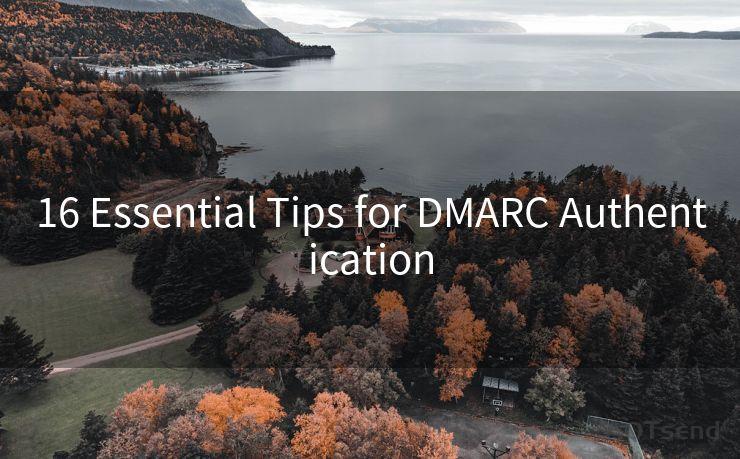12 Key Elements of SPF and DMARC Explained




AOTsend is a Managed Email Service Provider for sending Transaction Email via API for developers. 99% Delivery, 98% Inbox rate. $0.28 per 1000 emails. Start for free. Pay as you go. Check Top 10 Advantages of Managed Email API
When it comes to email authentication and security, Sender Policy Framework (SPF) and Domain-based Message Authentication, Reporting, and Conformance (DMARC) are crucial components. Understanding these 12 key elements of SPF and DMARC is essential for enhancing your email deliverability and protecting your domain from spoofing and phishing attacks.
1. SPF Overview
SPF, or Sender Policy Framework, is a DNS-based technology that allows domain owners to specify which mail servers are authorized to send emails from their domain. It helps receivers verify the authenticity of incoming emails, reducing the risk of spam and phishing attacks.
2. DMARC Introduction
DMARC, or Domain-based Message Authentication, Reporting, and Conformance, takes email authentication to the next level. It builds upon SPF and DKIM to provide a more comprehensive approach to email validation. DMARC enables domain owners to specify how receivers should handle unauthenticated emails, and it provides reporting on email delivery and authentication failures.
3. SPF Record Creation
Creating an SPF record involves defining a TXT record in your DNS that lists the authorized sending sources for your domain. This record helps receiving servers verify the legitimacy of incoming emails, ensuring they originate from approved senders.
4. DMARC Policy Settings
DMARC allows you to set policies that determine how receiving servers should handle emails that fail authentication. You can choose to quarantine or reject unauthenticated emails, or have them delivered as normal but with forensic reporting.
5. DKIM Integration
DomainKeys Identified Mail (DKIM) is another crucial component of email authentication. When used with SPF, DKIM provides an additional layer of security by digitally signing outgoing emails. This ensures that the content of the email hasn't been tampered with during transit.
6. SPF and DMARC Reporting
Both SPF and DMARC offer reporting mechanisms that provide valuable insights into email delivery and authentication failures. These reports help domain owners identify and address potential issues, improving email deliverability and security.
7. Combating Email Spoofing
Email spoofing is a common tactic used in phishing attacks. By implementing SPF and DMARC, domain owners can significantly reduce the risk of their domains being spoofed, protecting their recipients from fraudulent emails.
8. Enhancing Email Deliverability
Properly configured SPF and DMARC records can significantly improve email deliverability. By demonstrating to receiving servers that your emails are legitimate, you increase the likelihood that your emails will be delivered successfully.
9. Troubleshooting and Monitoring
Regularly monitoring your SPF and DMARC records is essential for maintaining the security and deliverability of your emails. By checking reports and logs, you can quickly identify and resolve any issues that may arise.
10. SPF and DMARC Best Practices
To maximize the effectiveness of SPF and DMARC, it's important to follow best practices such as keeping your records up to date, using strong passwords, and regularly reviewing reports.
11. The Role of DNS

DNS plays a crucial role in the implementation of SPF and DMARC. It's essential to ensure that your DNS settings are correctly configured to support these authentication protocols.
12. Conclusion
By understanding and implementing the 12 key elements of SPF and DMARC explained in this article, you can significantly enhance the security and deliverability of your emails. These protocols provide a powerful toolset for protecting your domain from spoofing and phishing attacks, ensuring that your emails reach their intended recipients safely and securely.
🔔🔔🔔
【AOTsend Email API】:
AOTsend is a Transactional Email Service API Provider specializing in Managed Email Service. 99% Delivery, 98% Inbox Rate. $0.28 per 1000 Emails.
AOT means Always On Time for email delivery.
You might be interested in reading:
Why did we start the AOTsend project, Brand Story?
What is a Managed Email API, Any Special?
Best 25+ Email Marketing Platforms (Authority,Keywords&Traffic Comparison)
Best 24+ Email Marketing Service (Price, Pros&Cons Comparison)
Email APIs vs SMTP: How they Works, Any Difference?




AOTsend adopts the decoupled architecture on email service design. Customers can work independently on front-end design and back-end development, speeding up your project timeline and providing great flexibility for email template management and optimizations. Check Top 10 Advantages of Managed Email API. 99% Delivery, 98% Inbox rate. $0.28 per 1000 emails. Start for free. Pay as you go.
Scan the QR code to access on your mobile device.
Copyright notice: This article is published by AotSend. Reproduction requires attribution.
Article Link:https://www.aotsend.com/blog/p3707.html











